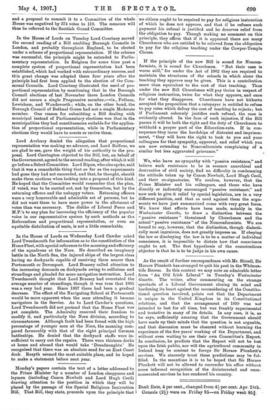We, who have no sympathy with "passive resistance," and believe
such resistance to be in essence anarchical and destructive of civil society, find no difficulty in condemning the attitude taken up by Canon Newbolt, Lord Hugh Cecil, and their co-signatories. We confess, however, that the Prime Minister and his colleagues, and those who have directly or indirectly encouraged "passive resistance," and now seek to give it relief by special legislation, are in a very different position, and that as used against them the argil. ments we have just summarised come with very great force. We know that efforts have been made, notably in the Westminster Gazette, to draw a distinction between the "passive resistance" threatened by Churchmen and the actual" passive resistance" of the Nonconformists. We are bound to say, however, that the distinction, though dialecti- cally most ingenious, does not greatly impress us. If obeying the law or disobeying the law is to be a matter of individual conscience, it is impossible to dictate how that conscience ought to act. The first hypothesis of the conscientious objector is that he is to be judge in his own cause.














































 Previous page
Previous page